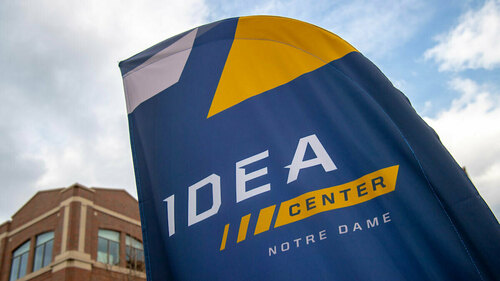
More than a dozen students and staff from the University of Notre Dame will display working prototypes of new hardware and software products for the home security, public works and health care industries at the annual Consumer Electronics Show (CES) Jan. 6-10 in Las Vegas.
Hosted by the Consumer Technology Association, CES is a showcase for the latest in consumer technology, from robotics and gaming to self-driving vehicles, wireless services and devices and software and apps. It is among the world’s largest electronics shows, with more than 150,000 visitors and more than 4,000 exhibitors annually, and it is where startups and major manufacturers regularly introduce their latest innovations.
The Notre Dame students and staff will manage four booths in the “University Innovations” section of Eureka Park, the designated spot for the thousands of startups at the show.
The students and staff and their inventions are:
• Senior Lingfeng Tao (philosophy and industrial design) will display Lumos Glasses. Lumos Glasses are affordable and fashionable light therapy glasses that help combat circadian rhythm disorders such as insomnia, depression and seasonal affective disorder. The glasses are currently in clinical trials at Stanford University.
• Sophomore Juan Sergio Buenviaje (computer science), alumnus Nathaniel Hanson (class of 2019) and Rian McDonnell (ESTEEM Graduate Program) will display DeLive. DeLive is a drone that delivers defibrillators to emergency situations. The fatality rate from cardiac arrest rises significantly after five minutes. DeLive delivers defibrillators to people in need quickly and safely so they can get the treatment they need to stay alive. DeLive is a 911 collaborator, using drones to streamline 911 operations and save lives.
• Alumnus Bradley Tener (class of 2017) will display Frost Control Systems. Frost Control Systems manufactures and services its own fixed Road Weather Information System (RWIS). This product uses monitors and infrared cameras to gauge the temperature of streets. It then relays that information to a city’s public works department, which uses the data to determine the optimal time to apply winter road treatment, what mixture should be used and how much should be applied when winter storms approach. RWIS aims to reduce winter road treatment, which saves cities money, and improve operational efficiency. Cities such as Fort Wayne and South Bend, Indiana use Frost Control Systems’ RWIS product.
• IDEA Center staff will display SafeSlide. SafeSlide is the world’s first smart lock for sliding glass doors. The lock operates via smartphone or fob and replaces wooden dowels. It is compatible with Alexa, Google and all major security company apps, and is expected to sell well to homes with pools. SafeSlide currently can withstand more than 600 pounds of pressure, more than enough to prevent forced entry.
This is Notre Dame’s first time participating in CES, which in addition to thousands of visitors draws scores of journalists and investors to Las Vegas each January from across the globe.
“The IDEA Center has received over 500 business idea or invention disclosures from faculty, students, alumni and the surrounding community since its inception three years ago,” said Bryan Ritchie, vice president and Cathy and John Martin associate provost for innovation at Notre Dame. “CES is largely viewed as one of the best places, if not the best place, to show off new electronics products to the world. As the number of exciting inventions in the electronics space grew at Notre Dame, it made sense for us to showcase these alongside the many other universities who display in Eureka Park at CES.”
Contact: Erin Blasko, assistant director of media relations, 574-631-4127, eblasko@nd.edu